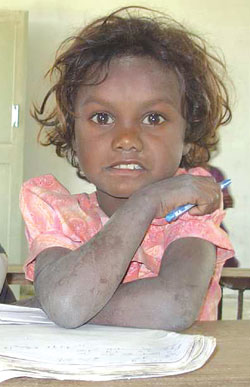|
|
"It's a love story," says 10-year old Sita Majhi (pictured). "Every night I read Muna Madan to my parents, they love it," the young girl says with pride. Majhi is the first of her Musahara family to ever enter a classroom.
In the remote village of Bariyapur, 20km south of Kalaiya in Bara, the lowest of the dalit castes-families of Musaharas, Chamars, Doms, Dusahas, and Dhobis-are the most illiterate of the poor and disadvantaged communities.
"There's literally a zero literacy rate among many adult dalits groups here," says schoolteacher Shyam Prasad Yadab. But Yadab is changing things for the future, having successfully motivated the parents of almost one hundred dalit children to send their sons and daughters to the Shri Dalit Primary School.
In the year since the school was moved closer to the village from Kalaiya, with financial assistance from the Japanese International Cooperation Agency (JICA), many dalit children have joined, and they now account for 90 of the 200 students.
Even upper caste children study here. "There is no mistreatment. We shake hands everyday and all play together," says fifth-grader Lila Nepali.
But, as the 400 dalit families here know, having a welcoming school is just part of the battle. Bariyapur\'s dalits are asking the government for help to get books, clothes, and stationery. "How long can we depend on NGOs and foreigners?" asks Babulal Majhi, chair of the school's management committee. The District Education Office says it simply does not have the money.
Most parents here are landless and make little money as wage labourers, migrant workers, and sharecroppers. Many feed their families one scanty meal a day.
"Educating our children is the only hope we have for improving our lot," says Yadab, who is one of the three underpaid teachers the school can afford. "We\'ve inspired dalit families to send their kids to school despite unimaginable hardship," says Majhi. But, he says, the financial strain could become too much, and parents could ask their children to drop out before they have finished primary school.
Most school dropouts in Nepal-which has one of the highest dropout rates in the world-come from impoverished, disadvantaged groups.
"I really, really want to stay in school," says nine-year-old Hari Majhi. "My mother was so happy when I wrote her name for her and she saw for the first time what it looked like." Hari wants to be a teacher when he grows up.



